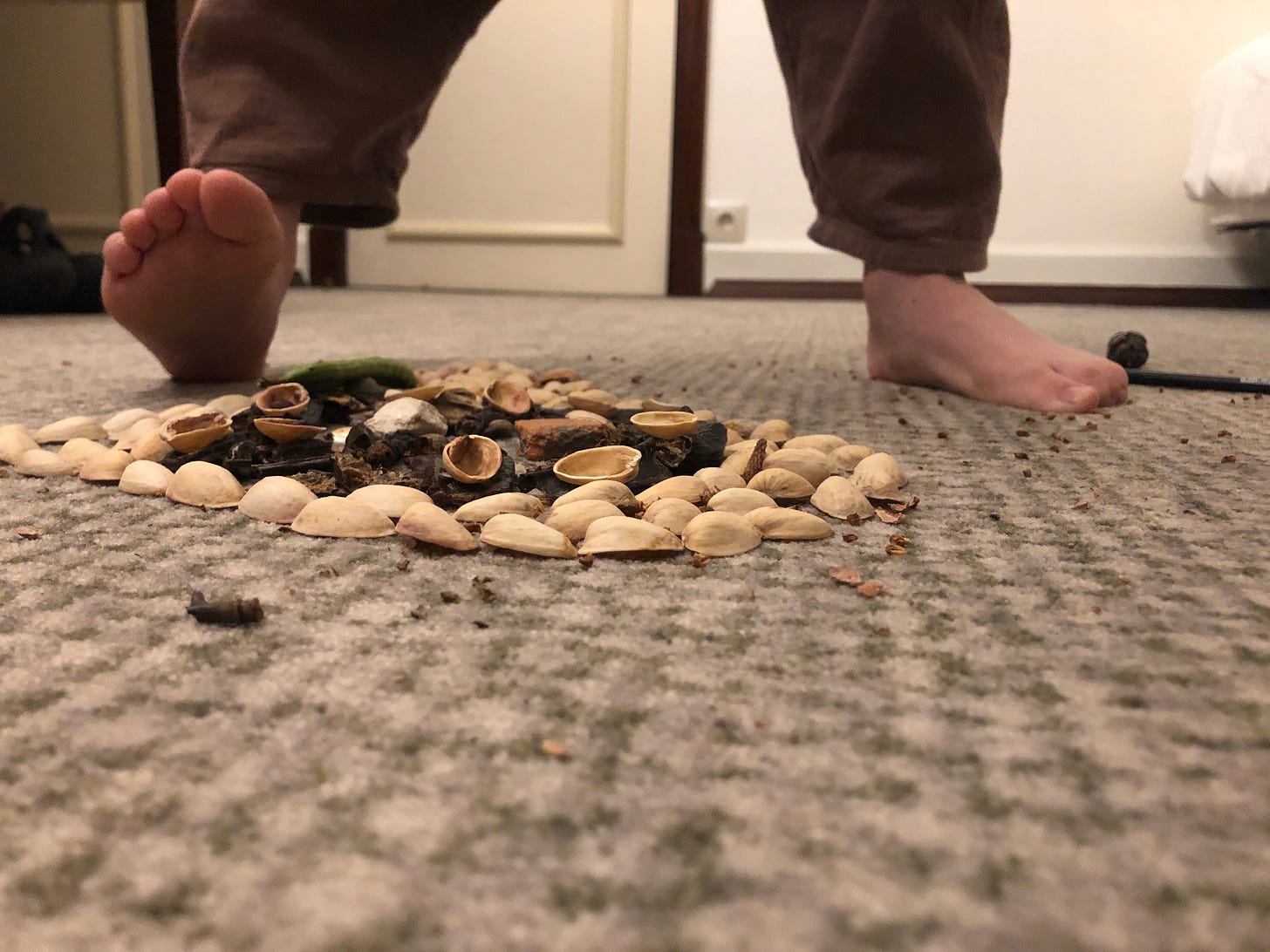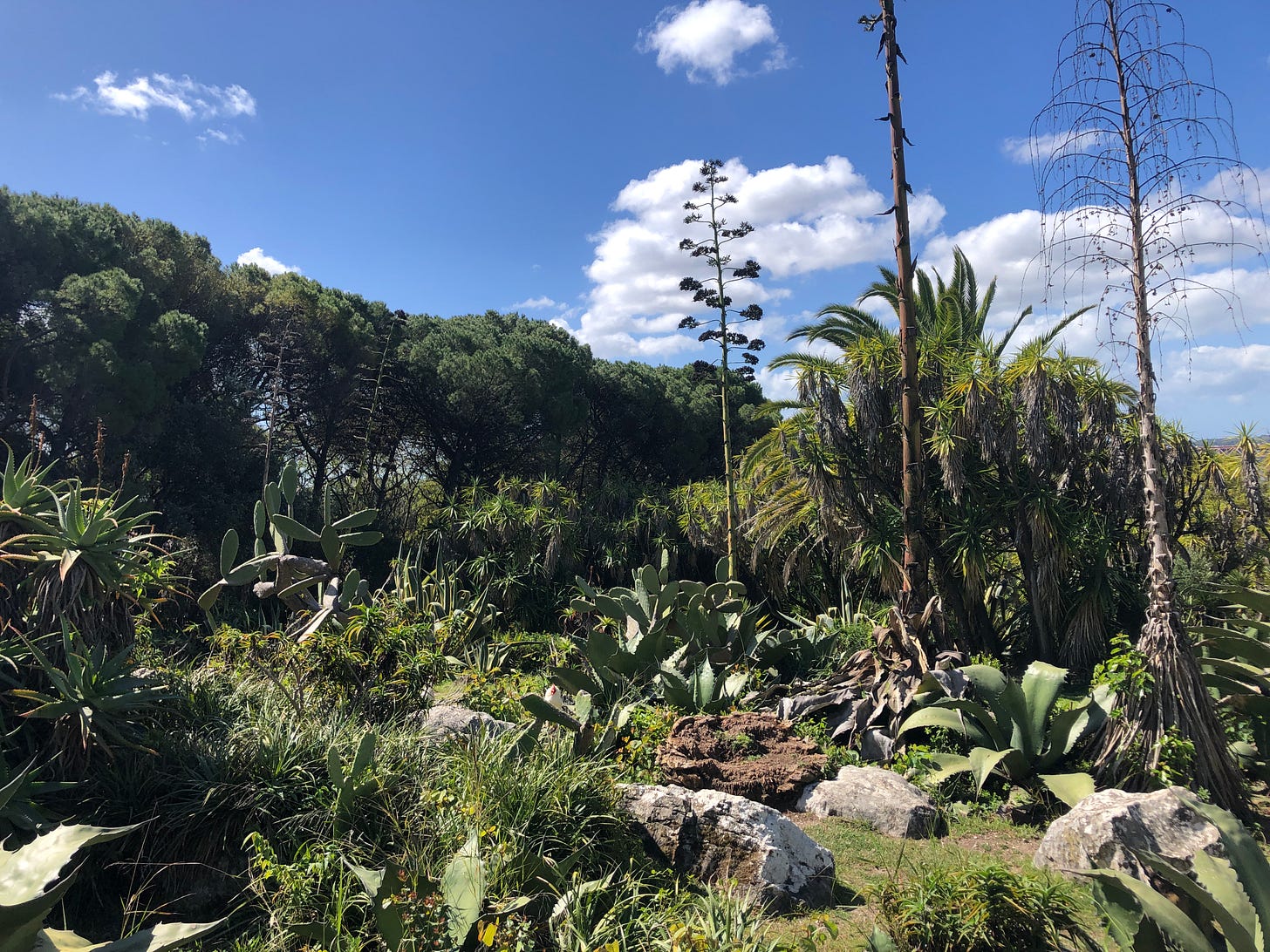a visit to Lisbon
music's role in the revolution of April 25th, saudade & a gentle entrance into spring
# of Tracks: 40ish
Length: 2.5 hours
Themes: the smell of sad rainbows ~ progressive Fado and the evolution of a regional music genre ~ a lot of acoustic guitars & singing in Portuguese ~ subtle electronics ~ the feeling of faded empire & old Europa
Link: spoti.fi (Spotify) — apple.co/3kheV8H (Apple Music) — bit.ly/3MuvCcG (YouTube)
As I type this, it’s been less than 72 hours since returning home from a trip to Portugal. It was my first time on a plane in over two years. We were mostly in Lisbon,1 with an excursion to the Algarve region in the south. This playlist is an outgrowth of the listening I did before and during the trip. I’m letting it steep for a shorter period of time than these mixes usually do because the mood of this music is perfect for this mid-spring moment when headlines are dominated by war and a pandemic’s supposed fade.
These are weary tunes designed for tired times.
A note about war and petty dictators: Wars usually boil down to some asshole’s attempt to write themselves into history. But humans usually live less than 100 years. And, unlike the multi-generational feuds waged by kings, the reign of petty dictators tends to seem strong, until it crumbles, all at once. (Granted I’m typing from the comfort of my Brooklyn home, rather than inhabiting the perspective of my ancestors, living as they did under the heels of asshole authoritarians in Ireland or Eastern Europe, in all the serf-like circumstances my bloodline pumped through.)
This past Monday was a national holiday in Portugal — Dia da Liberdade aka Freedom Day aka 25 de Abril. It commemorates the Carnation Revolution which overthrew the authoritarian Estado Novo regime in 1974, after 64 years in power.2 [One reader pointed out that a significant historical error in my statements about the duration of authoritarian rule in Portugal. Please click this footnote if you want your facts straight. And thank you to sharp eyed readers everywhere.] It not only ushered in Portugal’s transition to democracy, but stopped the country’s long-flailing efforts at maintaining an empire and the numerous colonial wars that effort required. The revolution was largely bloodless.3 Only four civilians were shot dead on that day in 1974—a rounding error in these times of mass shootings, unprovoked border wars, and casual chatter about tactical nuclear arms.
More intriguingly, at least for playlist creators and consumers like myself, it was a revolution bookended by music. The coup had two secret signals. Paulo de Carvalho's "E Depois do Adeus"4 (Portugal's entry in the 1974 Eurovision Song Contest) was broadcast around 11pm on the 24th of April to alert rebel soldiers that the coup had begun. The second signal was broadcast shortly after midnight on the 25th of April, when a different radio station played "Grândola, Vila Morena"—a song by a folk musician named Zeca Alfonso whose work was banned from Portuguese radio at the time. This song indicated to the the revolutionary military cadre, known as Movimento das Forças Armadas (MFA), that it was time to take over strategic points of power throughout the country.
Six hours later the authoritarian regime, then led by Marcello Caetano,5 relented. I’ll let Wikipedia take it from here:
Despite repeated radio appeals from the "captains of April" (the MFA) advising civilians to stay home, thousands of Portuguese took to the streets – mingling with, and supporting, the military insurgents. A central gathering point was the Lisbon flower market, then richly stocked with carnations (which were in season). Some of the insurgents put carnations in their gun barrels, an image broadcast on television worldwide which gave the revolution its name. Although no mass demonstrations preceded the coup, spontaneous civilian involvement turned the military coup into a popular revolution "led by radical army officers, soldiers, workers and peasants that toppled the senile [António de Oliveira] Salazar dictatorship, using the language of socialism and democracy."
To which I’d add “the language of socialism and democracy and music.”
Never forget: Music is Powerful.
Anyway, Afonso’s song kicks off this mix, and I’ve strewn in two other recordings by him further on in the playlist. I’m a new fan.6
What does the rest of the playlist sound like? Well, less than a week ago, while wandering around Lisbon, my very young child shared a poetic take on how his sensorium was absorbing the city: “If a rainbow had a smell this is what it would smell like,” he said, referring to some very fragrant strawberries visible in a shop’s window.
Let me shatter your hopes and warn that the feeling of this playlist is more or less the opposite of that rainbow scent. Rather, it has a distinct Saudade energy. Not sad exactly, but definitely a Mediterranean feeling defined by an undercurrent of melancholy. Maybe those strawberries are rotting just a little—still sweet smelling but no longer quite so delicious to taste. Those of you receiving my playlists are a sophisticated crowd, so I gather you may already be familiar with the term Saudade. For those who are not, read on in the extra points section down below…
And, as always, thanks for joining me on this wild ride.
Spotify version
Apple version
YouTube version
The playlist includes songs such as…
^ José Alfonso aka Zeca Alfonso aka Zeca: “Grândola, Vila Morena”
^ Waldemar Bastos: “Sofrimento”
^ Animal Collective: “Prester John”
^ DJ Marfox: “Tarraxo Everyday”
Extra Points: Saudade holiday slide show edition
Saudade describes a deep emotional state of profound melancholy and nostalgia. It’s said that the word is unique to Portuguese and cannot be translated to a single word in any other language. But spending time in Lisbon provides an intuitive understanding. It describes a feeling of loss, longing, and incompleteness. The existential ennui of a place that’s less than 50 years distant from an authoritarian regime that lasted for well over 50 years. Finally, Saudade is often associated with Portugal’s diminished role in world affairs over recent centuries. Let us foolish humans swing round our scales rather than settle into anything resembling balance:
But “decline” isn’t always a bad thing. If Lisbon represents a culture in decline, I want to visit again. Maybe that’s because, at this stage of my life, I wouldn’t want to dominate the world. Hell, in spite of the carnivorous pic at the top of this post, I don’t even necessarily want to dominate my lunch. Hand me Elon Musk’s bank account and a penis-shaped rocketship and tell me I could have anything, and I might give it all away to someone else. Frankly, if I have a dream for the 21st century, it’s that more and more people will let go of their notions of domination. I think it’d be a healthy reorientation for world leaders and industrialists and artists and everyone else.


Acknowledgement: Thanks so much to guides-slash-hosts-slash-friends Élio Vicente at Zoomarine, Ana Daniela Soares, Alberto Manguel, Craig Stephenson, and Patrick Bates-Brennan for the meals, snacks and showing us around a bit — and, as always, to Peggy and family for letting me tag along on yet-another wild ride.
Sticklers for languages would want me to mention that, in Portugal, Lisbon is actually called Lisboa.
The reader corrected my timeline as follows: “48 years without democracy, not 64, and not all under the Estado Novo. (I believe the Estado Novo began in 1933, following the Ditadura Nacional (1926-1933). The constitutional monarchy was ended in 1910 by a republic, not by the Estado Novo. So 48 years of no democracy (1926-1974), hence the ‘One day more slogan’ since it's now 48 years since the end of non-democratic rule.”
The moral of this story: don’t trust an American to recount any country’s history other than our own and, for that matter, probably not even our own!
The Carnation Revolution’s global aftermath and the decolonization of the former Portuguese empire was…not bloodless. Angola’s civil war lasted decades and millions died. Mozambique descended into a civil war leaving it one of the world’s poorest nations. East Timor was invaded by Indonesia and one estimate I saw cited over 100,000 deaths over the next 25 years. As a great writer once put it: So it goes…
No I’m definitely not talking about this guy:
To be honest I think de Carvalho’s song is a bit schmaltzy but to each his own and its revolutionary bona fides are certainly beyond reproach.
Not to be confused with everyone’s favorite Caetano:
Since discovering him, I’ve started going deep on the author of "Grândola, Vila Morena.” In his native country he was was famous enough to be known by the mononym Zeca, a political singer in a Woody Guthrie / Pete Seeger mode. But if you’re Googling for more info about him, try searching for Zeca Afonso — or find him under his birth name “José Afonso” on Wikipedia and streaming services.










